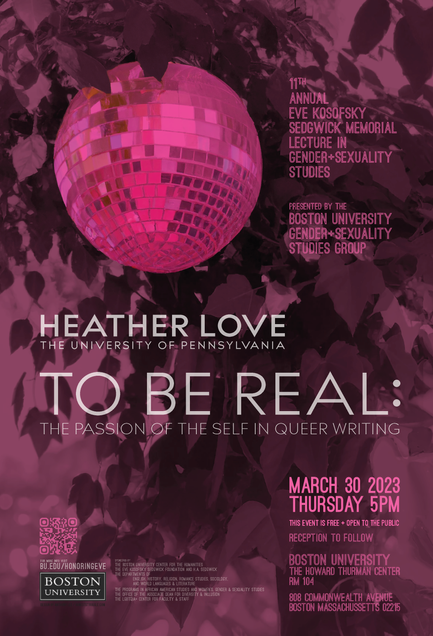Love
The 11th Annual Eve Kosofsky Sedgwick Lecture in Gender & Sexuality Studies
with Professor Heather Love
was held on
March 30, 2023
A video of this talk is available here.
“To Be Real: The Passion of the Self in Queer Writing”
The rise of queer theory around 1990 represents the convergence of two intellectual movements: post-structuralism and identity politics. The combination of philosophical skepticism about identity and investment in minority experience is the signature of queer writing. Since its inception, queer criticism has been known for its rigorous interrogation of the grounds of personhood. But it is also known for its renovation of academic style in the direction of the personal and the anecdotal. Early critics broke with scholarly convention to include narrative, slang, obscenity, song lyrics, and passages of heightened emotion. The tension between “subjectless critique” and self-revelation is everywhere in the field, but has mostly gone unnoticed. It is visible in two signal statements from the early 1990s. In Gender Trouble (1990), Judith Butler cited Nietzsche’s dictum that there is no “doer behind the deed” to question the grammar of the self. At almost the same moment, Eve Kosofsky Sedgwick countered a century of writing about homosexuality from a clinical distance, arguing that “Queer can only signify properly in the first person.” In this talk, I will address this defining tension in the field, which values both the undermining of the self and personal authenticity. My central text will be a crucial early work of queer/trans theory, Susan Stryker’s “My Words to Victor Frankenstein Above the Village of Chamounix: Performing Transgender Rage.” Finally, I will reflect on the afterlife of this defining tension in the rise of contemporary queer autotheory.
Presented by the Boston University Faculty
Gender & Sexuality Studies Group
With Thanks to Our Sponsors:
The Boston University Center for the Humanities, The Eve Kosofsky Sedgwick Foundation and H. A. Sedgwick, The Departments of English, History, Religion, Romance Studies, Sociology, and World Languages & Literature, and the Programs in African American Studies and Women’s, Gender & Sexuality Studies, the Office of the Associate Dean for Diversity & Inclusion and the LGBTQIA+ Center for Faculty & Staff
